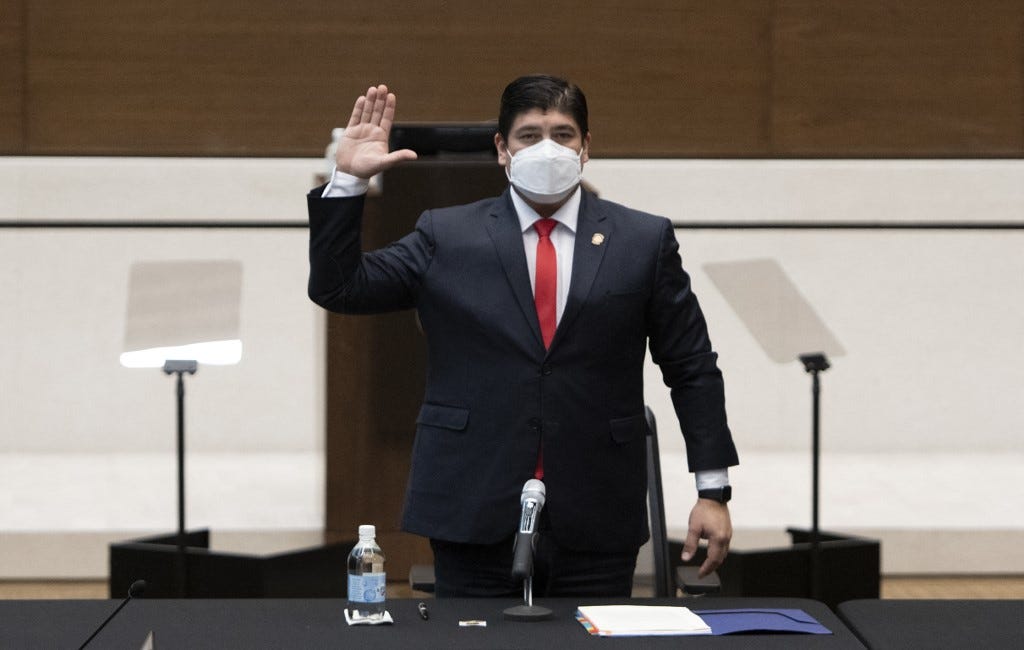President (not the one you think) faces Congressional inquiry for improper conduct
Costa Rica has political drama, too!
A president appeared before his country’s Congress on Wednesday regarding allegations of improper conduct. We’re talking about Costa Rica’s Carlos Alvarado, of course.
Let’s dive into what’s happening and what it all means.
The UPAD scandal: The basics
In 2018, the year President Alvarado began his term, his government created a Presidential Data Analysis Unit (UPAD, by its Spanish initials). The unit operated within the Presidency without public knowledge for nearly two years.
In February 2020, Alvarado signed and published a decree formalizing UPAD’s role within the government in La Gaceta, the official government newspaper. The decree, which can be read here, said UPAD would have access to citizens’ “confidential information.”
Local media soon caught notice with headlines like “Alvarado creates office to obtain confidential data from Costa Ricans.” Unsurprisingly, Costa Ricans didn’t take too kindly to the news.
Days later, the Presidency repealed the decree and disbanded UPAD.
But what data had UPAD been analyzing before its existence was made public? Costa Rican lawmakers formed a commission to investigate, and the Prosecutor’s Office raided the Presidency to seize computers and cell phones related to the case.
Wednesday, President Alvarado appeared before an investigate committee of the Legislative Assembly (Congress) to answer questions.
Could UPAD access confidential information?
UPAD would have had access to “confidential information,” according to the since-repealed decree. In addition, institutions would have had an “obligation” to provide the data-analysis unit with requested information:
The institutions of the Central and Decentralized Public Administration must allow access to all information that is required by the UPAD for the fulfillment of its aims and objectives, except those particular cases where the information is considered a state secret.
However, because Costa Rican law does not define “confidential” personal information, it’s unclear what exactly UPAD would have had access to1.
A second point of concern is the lack of safeguards regarding the information that UPAD may have accessed.
What is President Alvarado’s response?
In essence, President Alvarado argues that the phrase “confidential information” was used in error in the decree.
“When you read in isolation that UPAD will be given access to confidential information, that text is what generates the great anxiety,” he said Wednesday.
The goal of the UPAD, Alvarado explained, was for Costa Rica to make informed policy decisions based on population data.
“All the work that was done with the data analysis to generate technical and scientific knowledge for government decision-making has been and was done in good faith, to better serve Costa Rica,” he said.
In response to accusations that he had acted in bad faith or committed espionage, Alvarado retorted that “no one who is acting illegally” would publicize it, as he had done by publishing a decree in the official government newspaper.
What comes next?
After Wednesday’s high-profile events, an investigation will continue into what data UPAD accessed and whether the unit had acted illegally.
Importantly, the Legislative Assembly only has the authority to issue a final report of its investigation. It would be up to the Judiciary to pursue a potential trial.
If this happens and President Alvarado is convicted, he could be disqualified from public office, according to Costa Rica’s Criminal Code2.
Either way, expect a legal battle. President Alvarado has already raised concerns about the inquiry process, arguing that Wednesday’s interrogation before the Legislative Assembly did not comply with constitutional norms.
Support The Costa Rica Daily
The Costa Rica Daily will never spy on you. We can only exist with your support:
https://www.elfinancierocr.com/economia-y-politica/que-tipo-de-datos-existen-en-costa-rica-y-a/GS652LNWLFGN5HJ2OKEWTL3HZU/story/
https://www.elmundo.cr/costa-rica/carlos-alvarado-podria-ser-destituido-si-es-condenado-por-caso-upad/




